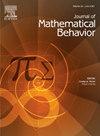Does use of a hypothetical learning progression promote learning of the cardinal-count concept and give-n performance?
Abstract
The general aim of the research was to conduct a rare test of the efficacy of hypothetical learning progressions (HLPs) and a basic assumption of basing instruction on HLPs, namely teaching each successive level is more efficacious than skipping lower levels and teaching the target level directly. The specific aim was evaluating whether counting-based cardinality concepts unfold in a stepwise manner. The research involved a pretest—delayed-posttest design with random assignment of 14 preschoolers to two conditions. The experimental intervention was based on an HLP for cardinality development (first promoting levels that presumably support and are necessary for the target level and then the target knowledge). The active-control treatment entailed a Teach-to-Target approach (first promoting irrelevant cardinality knowledge about recognizing written numbers and then directly teaching the same target-level goals with the same explicit instruction and similar games). A mix of quantitative and qualitative analyses indicated HLP participants performed significantly and substantially better than Teach-to-Target participants on target-level concept and skill measures. Moreover, the former tended to make sensible errors, whereas the latter generally responded cluelessly.

 求助内容:
求助内容: 应助结果提醒方式:
应助结果提醒方式:


